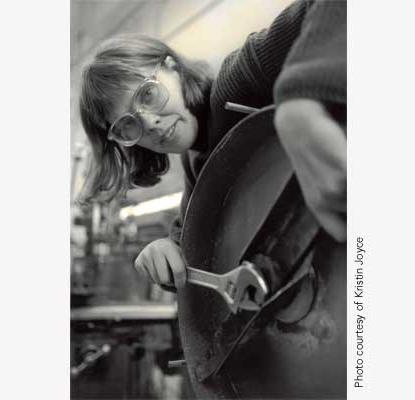Amy Smith
Though Amy Smith—who won the $30,000 Lemelson-MIT Student Prize in 2000—has displayed an inventive imagination since childhood, it was only after four years as a Peace Corps volunteer in Botswana that she found her true calling. Struck by the fact that "the most needy are often the least empowered to invent solutions to their problems," Smith decided to apply her engineering and design skills to invent low-tech devices with appropriate technologies for use in developing countries.
Smith designed her screenless grain hammermill after observing the women in Botswana manually grinding grain because the machine to perform this task—a motorized hammermill—used a screen to collect the flour that often broke and was too expensive to replace since it wasn't available locally. Using aerodynamics, Smith designed a hammermill that doesn't require a screen, is one-fourth the cost of traditional designs, requires less manpower, and produces a better quality product. Because she wanted her mill to be accessible for use in developing countries, Smith didn't patent her design.
Simplicity and reliability are the keys to Smith's designs for appropriate technologies, which also include a phase-change laboratory incubator that doesn't require electricity or rely on delicate instruments. Smith created a non-profit organization called A Drop in the Bucket to distribute and train people on using her incubators for testing water quality. In 2006 Smith received a grant from MIT's Deshpande Center for Technological Innovation to further develop her incubator.
Among Smith's other inventions are a microscope slide warmer, which uses phase change technology to diagnose tuberculosis; a clamp to regulate the flow of intravenous fluids, which enables nurses to serve more patients during an epidemic; and her first patent, the Smart Canister—an automatic dispenser, which assembles all the dry ingredients for a particular recipe.
Smith has a history of devoting her time to helping others, whether in designing appropriate technologies or serving the community. She has volunteered at a soup kitchen and a food bank, in addition to tutoring high school students and coaching in the Special Olympics.
The first female Lemelson-MIT Student Prize winner, Smith received her SB (1984) and SM (1995) in mechanical engineering from MIT. She also won the National Inventor's Hall of Fame Collegiate Inventors Competition (1999).
Since 2000 Smith has been instructor at MIT's Edgerton Center, which is a program that provides project-oriented learning experiences in engineering and science for MIT undergraduates and local 4th – 8th grade school groups. In 2001 Smith and Sally Susnowitz—assistant dean and director of MIT’s Public Service Center—co-developed the IDEAS Competition, which encourages teams to develop and implement projects that make a positive change in the world. Smith also founded the International Development Initiative (IDI) that enables MIT students to gain hands-on engineering education and community service experience through international development projects.
Since 2003 Smith has been an instructor for D-Lab, a series of courses and field trips that focus on international development, appropriate technologies, and sustainable solutions for communities in developing countries. In 2004 she was awarded a MacArthur Fellowship for creating technologies that improve lives in the developing world and inspiring students to do the same. Currently Smith is a senior lecturer in MIT’s department of mechanical engineering.


